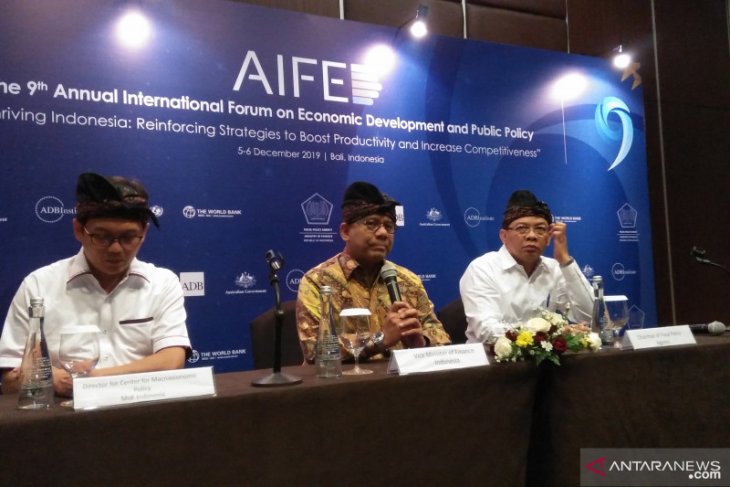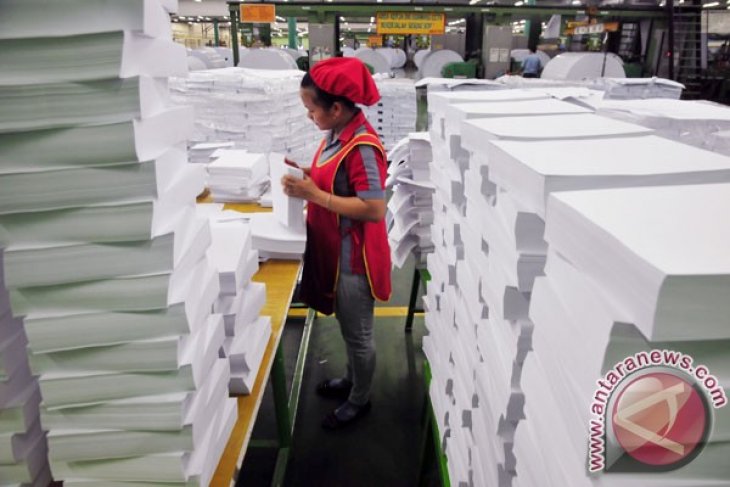Live Streaming
Program Highlight
Company Profile
December
Ministry Projects Indonesia to Exit Middle Income Trap by 2036
Written by Ani Hasanah
Director for Center of Macro Economy of the Finance Ministry Hidayat Amir stated on the sidelines of the 9th Annual International Forum on Economic Development and Public Policy (AIFED) in Nusa Dua, Bali, on Friday, Dec 6, 2019. (ANTARA/Dewa Wiguna/sh)
Indonesia is projected to exit the middle income trap by 2036, bolstered by the development of human resources, according to the Finance Ministry.
"Economic transformation has been carried out to build a strong basis for improving Indonesia's economy," the ministry's Director for Center of Macro Economy, Hidayat Amir, remarked on the sidelines of the 9th Annual International Forum on Economic Development and Public Policy (AIFED) in Nusa Dua, Bali, on Friday.
In 2036, public income is expected to reach US$12,233 per capita and will continue its rising trend to touch US$23,199 per capita by 2045, he noted.
In 2020, Indonesia is projected to become a nation, with public income surpassing the middle income level.
In its endeavor to achieve the target, the government has designed the national medium-term development plan (RPJMN) for the 2020-2024 period, with focus on the development of human resources, infrastructure, and bureaucratic and regulatory simplification, among others.
The government has allocated Rp2,540.4 trillion (some US$177 billion) of state expenditure in its 2020 state budget plan.
Of the total expenditure, Rp505.8 trillion (US$35.28 billion), or some 20 percent, will be used for education, and Rp132.2 trillion (US$9.22 billion), or five percent, for the health sector.
In the fiscal policy, Amir stated that the ministry had provided tax incentive in the form of close to 300 percent research and development (R&D) deduction for certain R&D activities conducted in Indonesia .
The government has also offered tax incentive for education and vocational training as well as research and development, with a maximum reduction of up to 200 percent of the total expenses incurred by a company.
Citing data of the National Development Planning Agency (Bappenas), Amir stated that Indonesia held vast potential, with its population estimated to reach 319 million in 2045.
Of the total population, some 47 percent belong to the productive age group, while 70 percent of them are from the middle income group.
Amir noted that Indonesia had a better economy as compared to BRICS countries, or Brazil, Russia, India, China and South Africa.
Indonesia's economic growth is more stable as compared to BRICS since five years back, it was ranked as the most vulnerable among the five fragile countries according to Euromoney's Country Risk Survey.
Indonesia's positive economic growth of five percent has drawn global recognition, with the Fitch Ratings reaffirming Indonesia’s rating at BBB, Moody's (Baa2), and Standard and Poor's (BBB).
Indonesia is ranked 73rd in the World Bank's Ease of Doing Business (EoDB), surpassing India that stood 77th, South Africa at 82nd, and Brazil at 109th. (ANTARA)
December
Indonesia Wins Paper Dispute at WTO
Written by Ani Hasanah
Illustration: Several workers in the paper converting section of the PT Indah Kiat Pulp & Paper factory in Perawang, Siak District , Riau (ANTARAFOTO/ FB Anggoro/AK)
The Dispute Panel at the World Trade Organization (WTO) decided in favor of Indonesia that had filed a lawsuit against Australia for adopting the Anti-Dumping Entry Policy (BMAD) on Indonesian A4 copy paper products (DS529).
Trade Minister Agus Suparmanto noted in a statement in Jakarta on Thursday (5/12) said the victory over this dispute was very important, considering its systemic impact on allegations of dumping from other countries. The Panel's decisions and recommendations were expected to minimize similar allegations in future.
The dispute between Indonesia and Australia took place on September 1, 2017. The Trade Minister emphasized that the WTO stated that Australia's policy of imposing BMAD on A4 copy paper products from Indonesia violated Articles 2.2 and 2.2.1.1 of the WTO anti-dumping agreement. Article 2.2.1.1 of the WTO's anti-dumping provisions was violated since Australia refuses to use the actual accounting data of producers although the data meets generally accepted accounting principles (GAAP) and reasonably reflects the costs associated with production.//Antara
December
Technology of Biomass Conversion able to Produce Bio-ethanol and Bio-product as Substitute for Gasoline
Written by nuke

Biomass is a potential renewable resource to produce energy and bio-products in Indonesia. Through appropriate conversion technology, biomass can be converted into bio-ethanol products that can replace gasoline. It was stated by Researcher of Research Center for Biomaterials, Indonesian Institute of Sciences (LIPI), Euis Hermiati during the Inauguration of Research Professors at the LIPI Auditorium in Jakarta on Wednesday (4/11).
“The major challenges faced in the application of biomass conversion technology to produce bioethanol and bio-products are readiness of technology at the commercial and economic scale of the products produced. Therefore, the development of biomass conversion technology to be bioethanol and bio-products needs to be done continuously in order to obtain technology that can produce economic products and it can compete with commercial products from fossil / Synergy between research institutions / universities and related ministries and industries in research and development activities of biomass conversion that needs to be strengthened.” Euis said.
Moreover, Euis Hermiati also explained that the technology also contributes to the effort of applying the concept of biological refineries to produce more economical bioethanol and bio-products as a substitute for refine fuel oil (BBM) and product from fossil. The successful development of the technology also supports the Indonesian government's efforts to meet the target of 23 percent use of renewable energy by 2025. (VOI/AF)
December
Hannover Messe Reveals the Reasons why Indonesia Elected As Partner Country 2020
Written by nuke PHOTO : VOI-NUKE
PHOTO : VOI-NUKE
Hannover Messe is a place where industry 4.0 was established and a home to industry pioneers, which has succeeded in being a forum for 500 world industrial markets in 2019. Every year, Hannover Messe chooses one country to become a partner country. Indonesia has been chosen to be a partner country in 2020. After attending a press conference at the JIExpo Kemayoran Commercial Building in Jakarta on Wednesday (4/11), Hannover Messe's Senior Vice President, Arno Reich explained the reasons why Indonesia becomes a partner country in 2020.
“Well… the main reason is that we believe Indonesia has strong potential not only because most people in the world in this country, but we can see "Making Indonesia 4.0" that's a strong word, strong effort to be one of the top ten economic in the world and with growing industry, growing market that's a perfect fit for Hannover Messe as important industrial fair to have a growing market who's is willing to join new technology, who's willing to invest in market, who's willing to invest in people, which is very important for all the industry worldwide. And Indonesia that's why we think that makes it perfect as a partner country for Hannover Messe.” Arno said.
Moreover, Arno Reich also explained that Hannover Messe is a forum for world industry and business contacts, which provides 6,000 companies that exhibit the latest technology and solutions to digitalize markets, logistics, and energy systems. Hannover Messe appreciated Indonesia that takes the opportunity to inform the industrial sector of what Indonesia has. (VOI/Nuke/AHM)


